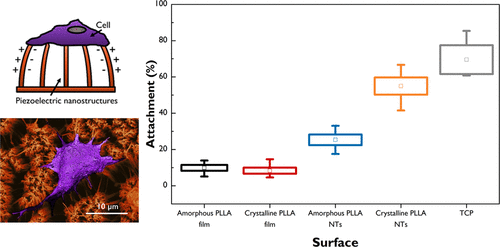当前位置:
X-MOL 学术
›
ACS Appl. Bio Mater.
›
论文详情
Our official English website, www.x-mol.net, welcomes your
feedback! (Note: you will need to create a separate account there.)
Poly-l-Lactic Acid Nanotubes as Soft Piezoelectric Interfaces for Biology: Controlling Cell Attachment via Polymer Crystallinity.
ACS Applied Bio Materials ( IF 4.6 ) Pub Date : 2020-03-11 , DOI: 10.1021/acsabm.0c00012 Michael Smith 1 , Thomas Chalklen 1 , Cathrin Lindackers 1 , Yonatan Calahorra 1 , Caitlin Howe 1 , Alkausil Tamboli 1 , Daniel V Bax 1 , David J Barrett 1 , Ruth E Cameron 1 , Serena M Best 1 , Sohini Kar-Narayan 1
ACS Applied Bio Materials ( IF 4.6 ) Pub Date : 2020-03-11 , DOI: 10.1021/acsabm.0c00012 Michael Smith 1 , Thomas Chalklen 1 , Cathrin Lindackers 1 , Yonatan Calahorra 1 , Caitlin Howe 1 , Alkausil Tamboli 1 , Daniel V Bax 1 , David J Barrett 1 , Ruth E Cameron 1 , Serena M Best 1 , Sohini Kar-Narayan 1
Affiliation

|
It has become increasingly evident that the mechanical and electrical environment of a cell is crucial in determining its function and the subsequent behavior of multicellular systems. Platforms through which cells can directly interface with mechanical and electrical stimuli are therefore of great interest. Piezoelectric materials are attractive in this context because of their ability to interconvert mechanical and electrical energy, and piezoelectric nanomaterials, in particular, are ideal candidates for tools within mechanobiology, given their ability to both detect and apply small forces on a length scale that is compatible with cellular dimensions. The choice of piezoelectric material is crucial to ensure compatibility with cells under investigation, both in terms of stiffness and biocompatibility. Here, we show that poly-l-lactic acid nanotubes, grown using a melt-press template wetting technique, can provide a "soft" piezoelectric interface onto which human dermal fibroblasts readily attach. Interestingly, by controlling the crystallinity of the nanotubes, the level of attachment can be regulated. In this work, we provide detailed nanoscale characterization of these nanotubes to show how differences in stiffness, surface potential, and piezoelectric activity of these nanotubes result in differences in cellular behavior.
中文翻译:

聚-l-乳酸纳米管作为生物学的软压电界面:通过聚合物结晶度控制细胞附着。
越来越明显的是,细胞的机械和电环境对于确定其功能和多细胞系统的后续行为至关重要。因此,细胞可以直接与机械和电刺激交互的平台引起了人们的极大兴趣。压电材料在这方面很有吸引力,因为它们能够相互转换机械能和电能,而压电纳米材料尤其是机械生物学工具的理想候选者,因为它们能够在兼容的长度尺度上检测和施加小力。具有细胞尺寸。压电材料的选择对于确保与所研究的细胞在刚度和生物相容性方面的兼容性至关重要。在这里,我们表明,使用熔压模板润湿技术生长的聚-L-乳酸纳米管可以提供“软”压电界面,人类真皮成纤维细胞可以轻松附着在该界面上。有趣的是,通过控制纳米管的结晶度,可以调节附着水平。在这项工作中,我们提供了这些纳米管的详细纳米级表征,以展示这些纳米管的刚度、表面电位和压电活性的差异如何导致细胞行为的差异。
更新日期:2020-04-23
中文翻译:

聚-l-乳酸纳米管作为生物学的软压电界面:通过聚合物结晶度控制细胞附着。
越来越明显的是,细胞的机械和电环境对于确定其功能和多细胞系统的后续行为至关重要。因此,细胞可以直接与机械和电刺激交互的平台引起了人们的极大兴趣。压电材料在这方面很有吸引力,因为它们能够相互转换机械能和电能,而压电纳米材料尤其是机械生物学工具的理想候选者,因为它们能够在兼容的长度尺度上检测和施加小力。具有细胞尺寸。压电材料的选择对于确保与所研究的细胞在刚度和生物相容性方面的兼容性至关重要。在这里,我们表明,使用熔压模板润湿技术生长的聚-L-乳酸纳米管可以提供“软”压电界面,人类真皮成纤维细胞可以轻松附着在该界面上。有趣的是,通过控制纳米管的结晶度,可以调节附着水平。在这项工作中,我们提供了这些纳米管的详细纳米级表征,以展示这些纳米管的刚度、表面电位和压电活性的差异如何导致细胞行为的差异。









































 京公网安备 11010802027423号
京公网安备 11010802027423号